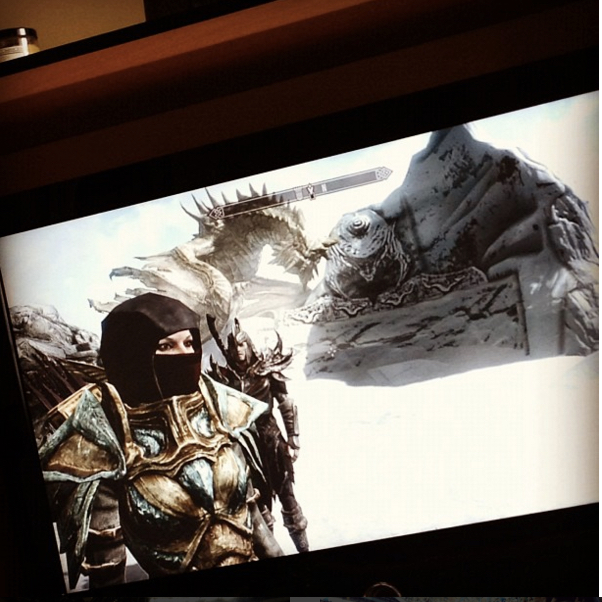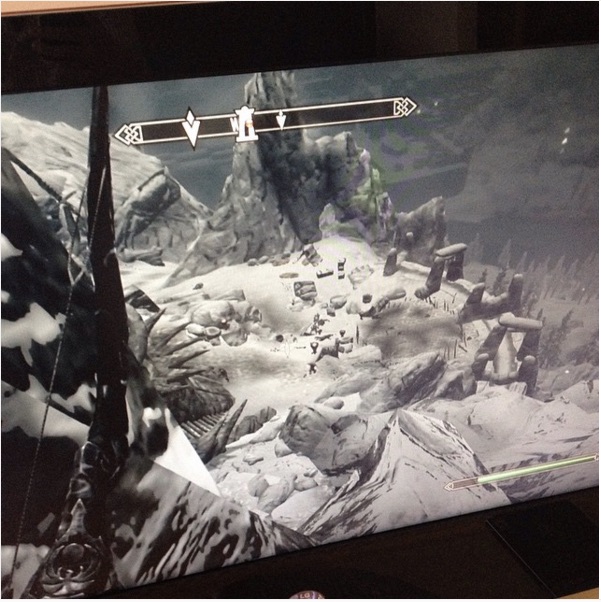Some of my fondest childhood memories are of playing Nintendo and Super Nintendo games with my brother, and making that long suburban walk to the arcade on summer afternoons. In high school and my early twenties, I dropped the hobby for a while mainly due to lack of a console and a lack of funds (and discovering blogging probably helped), but I happily returned to it after a few years. I haven’t looked back since.
I hesitate to call myself a “gamer,” mainly because I associate that word with someone who’s quite serious about it, who enjoys playing almost any kind of game. My husband is more like that than I am, and teases me for being picky about the kind of games I like (and before anyone thinks that’s unfair, I do have to vocalize my bewilderment when I see him playing games that I would give up on in two minutes – so it evens out).
I don’t mean to make myself sound like some video game snob. While it’s true that I can be strangely picky about superficial things such as setting (no space or post-apocalyptic environments for me, thanks) and graphics, my favourite games are the ones with a compelling, immersive story and well-written characters.

When Skyrim (my favourite game of all time thus far) came out in 2011, my husband and I took turns playing. I had slightly more free time than he did then, so I progressed a little further in the main story than him. Many shouts of, “Oh shit, wait ’til you get to this part!” were heard from the living room. The story and world of Skyrim were so engaging that I played it right up until a couple of months ago, when our PS3 gave up the ghost with the Skyrim disc still in it.
And, despite how much I knew I loved that game, I was surprised to find that I actually missed it. I missed almost everything about it. The music, the world, even my character (whose face I spent a long time creating at the start of the game). I had beaten that game long ago and completed all the side quests I’d cared about, but I kept returning to it. If I was anxious or frustrated or bored or even in a perfectly fine mood, I’d pop in the disc and just run around in the game, jumping up to the tops of mountains, firing arrows at giants and bandits from high above where they couldn’t reach me. Returning to that world over and over again was strangely relaxing.

I was thinking about all of this recently because I’m feeling the same pull towards the game I’m playing now, Dragon Age: Inquisition. The first Dragon Age game was my original Favourite Game of All Time. I played it when I was recovering from eye surgery, and while that was maybe not the best thing to do to my eyes, I couldn’t resist (and no harm done, anyway). I remember driving home from a meeting and thinking about the quest I would do next in the game, and how that would influence the story, and how my character’s companions would react. And that to me is the biggest parallel between a good video game and a good book – I think about it when I’m not actively playing/reading, and after it’s over.
And much in the same way that a good book can make you think about yourself and your own life, a video game is a great chance to analyze your own decisions and logic. For example, I have a friend who has no compunction about playing as a fully evil character in the fictionalized environment of a video game, but I can’t do it. And that applies to non-evil things, too. I’m on my second playthrough of Inquisition and making some significantly different choices than I did the first time around, and a few of those choices were actually difficult for me to execute. What do these things say about me? Like with all of my favourite games and my favourite books, I’m right there in the world, seeing how the protagonist’s choices affect people and what happens in the story, and thinking about why I had a particular response to a character or an event. In a game those repercussions are arguably more immediate and less fixed than in a book, which raises the mental anguish potential.
Books and video games are different of course, and games have a long way to go in achieving the same equality standards and cultural significance as books, but I can’t help but see so many similarities between the two. With video games I get to be a writer and a reader at the same time, and it’s wonderful.
Oh I have so much to say on this topic I don’t even know where to start!
I totally agree with you on the narrative/universe pull. To me, the common point between a good book (or film as a matter of fact) and a good video game is that the universe continues to exist in my head, as you say, even after I play/read or when I’m finished with it. Not only questioning about the characters or scenario spins or what I’m going to do next (kill the Crestwood dragon, tonight, if you must know), but really giving life to this background, imagining what may be beyond the video game itself, letting the universe live through your imagination.
In a way these are fantasy universes to be engaged in, immersed, that jolt imagination awake, but also lead to a number of questions about the current world, or humans, or myself, as you say. And that’s what good books do, too.
To take the example of Thedas (did you know that meant “The Dragon Age Setting”, really? And they kept the name. Anyway), I find this ongoing narrative around mages, templars, chantry and all to be a really powerful metaphor of many current questions. About the role of religion, faith, and religious institutions in a human society, about the control of populations, and the idea of punishing or restraining people based on what they *could* do versus judging them for what they already did (a bit in a minority report kind of way).
But also, I feel this kind of game, with narrative choices (or at least the illusion thereof, thanks to skilled developers) really makes us reflect on our choices as human beings as you say, because the main character does have ethical choices to make and we, as players, make this choice too. I actually feel the same way as you do during my second playthrough of DAI: I decided to make different significant choices to see the difference on the universe, in the character reactions etc., but in the end, I feel like there is a “right” choice for myself, as the player, which goes with my morality and values, maybe, and it does raise questions about myself indeed.
I’m also quite dumbfounded at how I (or my main character) can end up liking (or strongly disliking) characters, despite them being completely scripted and not real at all. I think it was a Kotaku journalist who wrote about how his Inquisitor ended up romancing Dorian, despite he himself not being gay at all – it’s like this universe springs to life and engages us as players, but also takes its own course depending on the choices you make, the characters you speak to most and all. I also ended up having in my team (and romancing) characters I initially didn’t really find interesting but somehow, my inquisitor made her own way into this world.
it’s too bad you dislike sci-fi universes, you would have enjoyed Mass Effect a lot I think.
PS: Am I the only one who wonders why I rule the Inquisition in my pyjamas or…?
As I wrote this post, I was looking forward to reading your comments!
I didn’t know that about the Thedas name – how funny! I really have enjoyed experiencing the expansion of that world through the games (even DA2, ugh). I love that about fantasy and sci-fi worlds; the ability to comment on our world without commenting on *our world.*
I did read that Kotaku article, and I’ve read elsewhere that quite a few straight men romanced Dorian in the game. I was surprised as well at how much I ended up liking his character. At first I thought he would just be a snarky jerk, but I found his character’s opinions quite nuanced, and my Inquisitor returned to speak with him more than anyone else. I was actually kind of annoyed that I couldn’t romance him – my own thoughts interfering with the game world, I guess!
I hope the fourth game will show us more of Tevinter. The games always portrayed Tevinter as being like Mordor, so it’s refreshing to see characters like Dorian and Krem who suggest that it’s a place like any other.
I did try Mass Effect! I gave it my best shot but I just couldn’t do it. I’m disappointed in myself. :) I’ve heard it’s very good.
Haha, from what I’ve read online, the pyjamas thing mystifies many! Maybe after a long day of inquisiting, you just want comfort.
I hope you had fun with the dragon!
Oh I got busted by the dragon, I’m going to have to try again with a higher level character. The joys of nightmare difficulty :)
Haha that’s how you notice the BioWare managed to create an interesting universe players are drawn to knowing more about: “even DA2”. This is also a thing that I love about this kind of universes, on top of commenting our world metaphorically, they are able to recreate a whole universe full of countries and folklore and characters and history and background that you want to explore and know more about through each game, and sometimes even transmedia elements (I believe they have published comics, or a novel maybe? I’m not sure)
Characters are definitely a strength of BioWare games in general. I also ended up liking Dorian despite the fact that he seemed to be very stereotyped (the sparkly self absorbed gay guy). At first I was like “ugh, guys…” but then, when you speak to him and do his quests you realize he is quite deeper than it seems. And it’s worth for every character (or almost) really. IT’s like they play with stereotypes. Like Cullen, the righteous soldier who really struggles with trauma and drug addiction, or the storyteller dwarf Varric (one of my favourites too). That’s also the type of elements that makes you come back to a universe, well construced, deep characters. I know that’s what makes me like a book, too.
Anyway, I think I could babble about Dragon Age endlessly these days. Pyjamas are fun. Cutting someone’s head off in my pyjamas are quite disturbing though. Shouldn’t be laughing that much.
I admire you playing on Nightmare! I never do. I’m fairly challenge-averse – another way video games give me a clue to my personality! :)
Speaking of Dorian, I used to take him and Solas out and just run around aimlessly waiting to trigger banter. They are so snarky with each other and it’s fantastic.
And speaking of Solas and characters and history and folklore, have you seen this article with theories about what the game’s ending meant?
http://kotaku.com/dragon-age-inquisitions-ending-explained-1671137779
I am now even MORE excited for a sequel/DLC than I was before.